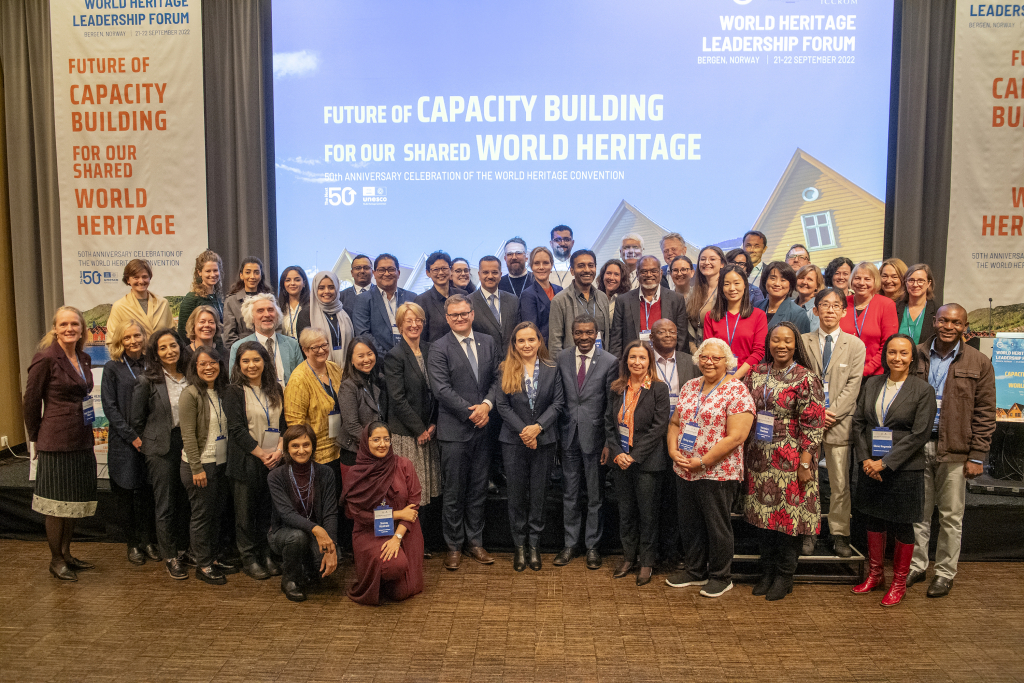Norway's Ministry of Climate and Environment signs a cooperation agreement with World Heritage Advisory Bodies ICCROM and IUCN in support of global environmental and cultural heritage
Rome, 23 September 2022 – The Great Barrier Reef, Machu Picchu, Rice Terraces of the Philippine Cordilleras, the West Norwegian Fjords – they’re some of the world’s most prized heritage sites. These are the kinds of places we hope to show future generations. We take for granted that they will be there waiting for us, but they are at risk: frequently threatened by climate change, disasters and development proposals.
World Heritage sites like these must be protected through proper management. In recognition of this reality, the Norwegian Ministry of Climate and Environment has extended its support of the World Heritage Leadership (WHL) Programme, reinforcing its commitment to fostering future protectors of World Heritage and champions of the World Heritage Convention.
Norway renewed its commitment to the future of World Heritage with its inauguration of the second phase of the WHL Programme, announced at the World Heritage Leadership Forum – an initiative marking the 50th anniversary of the World Heritage Convention – held in Bergen, Norway, from 21 to 22 September 2022.
 The World Heritage Leadership Forum brought together national focal points and representatives from 13 countries and 10 World Heritage Category 2 Centres and networks. Photo credit: Helge Skodvin
The World Heritage Leadership Forum brought together national focal points and representatives from 13 countries and 10 World Heritage Category 2 Centres and networks. Photo credit: Helge SkodvinIn opening remarks, Norwegian Ministry of Climate and Environment State Secretary Aleksander Øren Heen said: “World Heritage properties are global common goods. Norway attaches particular importance to the capacity-building work to ensure that all countries are enabled to preserving and benefitting from their own cultural and natural heritage. Good, long-term management of a nation’s cultural and natural heritage is essential for sustainable development.”
“Managing World Heritage in the 21st century is a complex task and we need to build our own capacities to do our jobs better,” said ICCROM Director-General Webber Ndoro. “The best way to do that is to learn from each other and support each other, tapping into a global family working together to protect and conserve World Heritage. We extend our deep gratitude to Norway for recognizing the pressing need to continue developing present and future generations’ capacity to care for our precious World Heritage.”
“World Heritage Leadership empowers heritage practitioners across the globe with the tools and capacity to deliver excellence in the management of the planet’s most iconic places,” said Grethel Aguilar, IUCN Deputy Director General. “IUCN is proud to collaborate with ICCROM, and our many partners, on such a valuable initiative for the World Heritage community. We thank sincerely Norway for their continued engagement and support for this vital work.”
The Forum allowed stakeholders to reflect upon how capacity building has contributed to the first 50 years of implementation of the World Heritage Convention and how to strengthen this work as we enter the next phase of the WHL Programme.
About the World Heritage Leadership (WHL) Programme
The WHL Programme is designed to shape the future leaders of World Heritage. It aims to improve conservation and management practices for culture and nature by providing guidance and tools to effectively manage World Heritage and creating dynamic networks of peer learning. The Programme is a capacity-building partnership between the International Centre for the Study of the Preservation and Restoration of Cultural Property (ICCROM), the International Union for Conservation of Nature (IUCN) and the Norwegian Ministry of Climate and Environment, in collaboration with UNESCO and the International Council on Monuments and Sites (ICOMOS).
The Programme’s first phase (2016-2022) emphasized creating and revising World Heritage resources to provide integrated and structured guidance and tools to managers of World Heritage. In the next phase, the Programme will focus on working with national, regional and international actors, institutions and networks to mainstream capacity building across regions and generations. It will focus on strengthening regional networks and multiplying capacity-building efforts in diverse languages and contexts.
Ministry of Climate and Environment of the Government of Norway
presse@kld.dep.no
(+47) 947 82 505
ICCROM is an intergovernmental organization dedicated to the conservation of cultural heritage. ICCROM aims at improving the quality of conservation practice as well as raising awareness about the importance of preserving cultural heritage. It serves the international community as represented by its Member States. ICCROM contributes to preserving cultural heritage in the world today and for the future through five main areas of activity: training, information, research, cooperation and advocacy.
The Ministry of Climate and Environment (Klima- og miljødepartementet) of the Government of Norway has a particular responsibility for carrying out the climate, environmental and heritage policies of the Government of Norway. The ministry consists of five specialist departments in addition to an organizational department, a communications unit and a front office. The ministry is the agency manager for the Species Data Bank, Enova, the Meteorological Institute, the Environment Agency, the Norwegian Cultural Heritage Fund, the Norwegian Polar Institute, the National Antiquities Authority, the Center against Marine Litter and the Svalbard Environmental Protection Fund.
IUCN is a membership Union composed of both government and civil society organizations. It harnesses the experience, resources and reach of its more than 1 400 Member organizations and the input of more than 15 000 experts. IUCN is the global authority on the status of the natural world and the measures needed to safeguard it. IUCN is the official advisor on nature to UNESCO’s World Heritage Committee.
